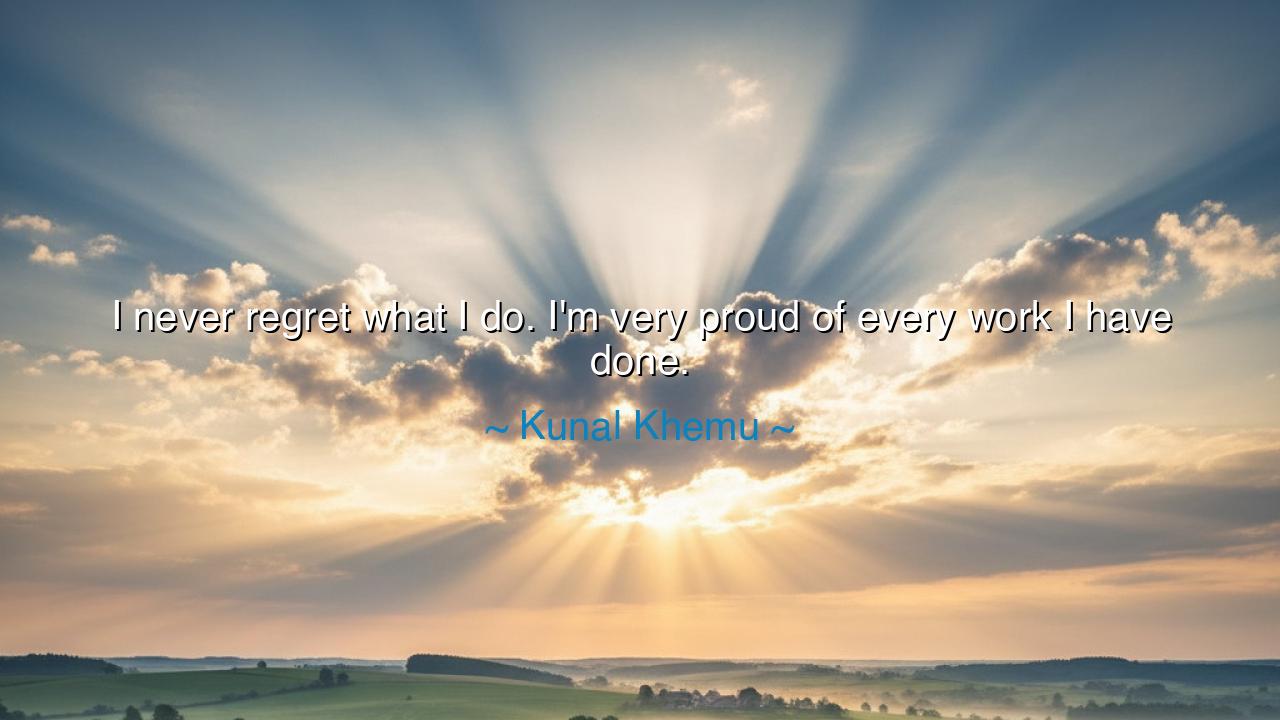
I never regret what I do. I'm very proud of every work I have






In the journey of creation and endeavor, there lies a virtue rare and enduring: the ability to honor one’s own labors without regret. Kunal Khemu speaks to this timeless principle when he declares, “I never regret what I do. I’m very proud of every work I have done.” These words echo the wisdom of sages who taught that the value of effort is measured not only by its reception, but by the sincerity and dedication poured into it. To act with purpose and integrity is to leave a mark upon the world that endures beyond the fleeting judgments of others.
To feel pride in one’s work is to recognize the labor of the heart and mind as sacred. Khemu’s insight reminds us that every task undertaken, every creation brought forth, carries within it a piece of the self. The ancients knew that human effort is a reflection of the soul: whether in humble toil or grand achievement, the act itself holds dignity. To regret what has been done is to deny the honor inherent in effort; to embrace it is to walk in the light of wisdom.
The absence of regret is a mark of courage and clarity. It requires the strength to accept both triumph and misstep, to see each endeavor as part of a greater journey of growth. The artist, the warrior, the scholar — all who tread the path of mastery must confront doubt, criticism, and failure. Yet in honoring one’s own work, as Khemu does, the spirit becomes resilient, and the heart remains steady, unshaken by the tides of external judgment.
The origin of this teaching is as old as civilization itself. From the builders of the great temples to the poets and scribes of antiquity, humanity has celebrated those who act with conviction and accept their labor as part of their legacy. Pride in honest work is a virtue that transcends time and culture, for it acknowledges the sacred connection between effort and character, between action and the shaping of the self.
Thus, let this teaching endure: undertake every work with sincerity, embrace your efforts with pride, and let regret find no dwelling in your heart. In doing so, one cultivates a life of integrity and honor, leaving behind a legacy of courage, dedication, and the quiet yet enduring glory of a soul fully committed to its journey.






KNKim Nhung
I really respect Kunal’s view on not regretting his work, but could there be a downside to this kind of mindset? What about when we make mistakes that affect others? Can we truly be proud of every action, even when we know there could have been a better way? Is it possible that pride in our work should come with the humility to accept and learn from our missteps?
HNVu Hoang Ngan
It’s inspiring to hear someone speak so confidently about their work without regret. But is that even possible? In my experience, there are always decisions we look back on with some level of doubt. Does Kunal’s statement reflect a healthy level of self-confidence, or does it indicate a refusal to learn from mistakes? I wonder if this outlook helps him push forward, or if it could be a form of denial?
PCHuynh Phuc Chi
I admire Kunal's confidence in his work, but I wonder if it's always that simple. Don't we all have moments where we look back and wish we had done something differently? Is it possible to truly be proud of every single thing you’ve done? Or is it more about accepting the imperfection in everything we do and finding pride in the growth rather than the work itself?
TVThu Vu
Kunal Khemu's perspective on never regretting his work is refreshing, but is it realistic for everyone? Is it possible to be truly proud of every decision we make, especially in a world that is so full of mistakes and learning moments? Can anyone genuinely look back and say they have no regrets, or is this mindset more about embracing the journey, including the mistakes along the way?